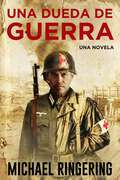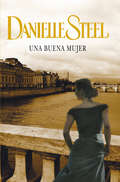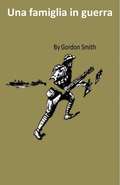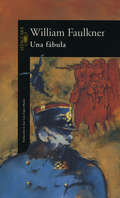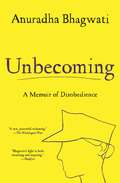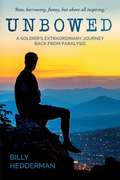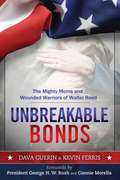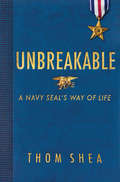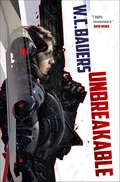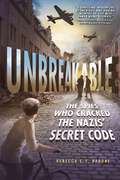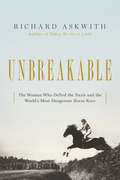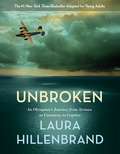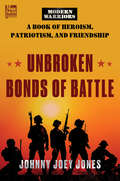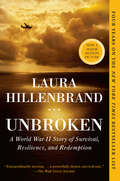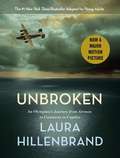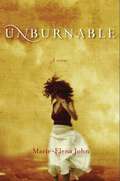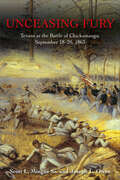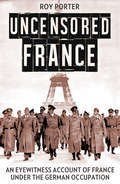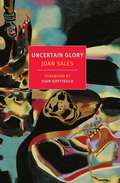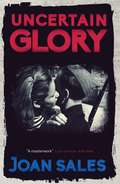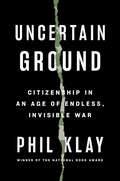- Table View
- List View
Una Deuda de Guerra
by Michael RingeringUn deseo a punto de morir y un misterioso manuscrito sacan a la luz un relato desgarrador del compromiso eterno de un soldado de pagar una deuda, trascendiendo la ideología y la división racial, que conduce al precio final pagado. “Michael Ringering teje una historia bellamente estratificada, contra las circunstancias más extremas, recordándonos que lo que compartimos siempre será más poderoso que las fuerzas contemporáneas que buscan dividir. Una Deuda de Guerra es verdaderamente una pieza magistral y atemporal.” ~ Teniente Coronel Casey Grider, Fuerza Aérea de Estados Unidos En el funeral de su madre, Paul Bacca, un consumado editor, es abordado por un misterioso veterano militar condecorado que afirma haber sido enviado ante la solicitud final de su madre: entregar un manuscrito inédito de la única novela escrita por una poetisa aclamada. Paul descubre posteriormente un secreto familiar impactante que cambia para siempre su vida y la de sus hermanos. La historia propulsiva, desgarradora que Paul lee detalla una amistad inconcebible, una historia de vidas eternamente entrelazadas en una deuda entre enemigos. “… una lectura convincente que tiene éxito debido a su trama llena de acción, diálogos frescos, personajes convincentes y giros llenos de suspenso. Él (Ringering) puso su corazón y su alma en este libro, y se nota.” ~ Jerry Crasnick, Asesor Principal, Asociación de Jugadores de Béisbol de las Grandes Ligas, Periodista Deportivo, y ex escritor de béisbol para ESPN y otros medios. ¡Las Reseñas de Libros Favoritas de los Lectores le da 5 estrellas… 3 veces, en 3 reseñas brillantes separadas! EVOLVED PUBLISHING PRESENTA una historia de miedo y honor, vida y muerte, guerra y humanidad, en un viaje que une la Segunda Guerra Mundial a una familia moderna.
Una Mascota para Navidad
by Rachelle AyalaKelly Kennedy pensaba que su vida estaba finalmente bien encaminada. Prometida al hombre de sus sueños y con un bebé en camino, ella le asegura a su hija de cinco años, Bree, que el padre que ella eligió por Navidad todavía la quiere. Desgraciadamente, el veterano de guerra Tyler Manning ha estado lejos la mayor parte del año. Recuperarse del estrés postraumático no es fácil. En vez de preocupar a Kelly, Tyler emplea su tiempo en viajar a Afganistán para trabajar en la organización benéfica para niños que ha fundado. Kelly decide distraer a Bree con promesas de una mascota por Navidad. Cuando Tyler es tomado como rehén por un grupo terrorista, ella encuentra difícil convencer a Bree de que serán una familia de verdad a tiempo para navidad. Una Mascota para Navidad es una secuela de Un Padre para Navidad. Aunque esta historia puede leerse como libro independiente, entenderás más del aspecto de la relación entre Kelly, Tyler, y Bree al leer Un Padre para Navidad primero. Serie Navidades Veteranas: Libro #1: Un Padre para Navidad Libro #2: Una Mascota para Navidad Libro #3: Una Boda para Navidad
Una Perla Rota
by Dawn BrowerLa muerte y la destrucción de la guerra pueden destruir incluso a los más fuertes entre nosotros. ¿Será la pérdida y el dolor demasiado para Rebecca para soportar? El año es 1941 y el paraíso es una forma de vida en Hawai. Para Rebecca O'Shea las cosas no podrían ser más perfectas. Ella tiene la carrera de sus sueños como enfermera naval, y está enamorada del hombre de sus sueños, parece que lo tiene todo. Un regalo empático que ha tenido toda su vida comienza a crecer, llenándola de emociones y premoniciones que sugieren que hay una gran oscuridad cerca. Justo cuando cree que no puede soportar más a su tutor, Joel llega para ayudarla. La vida de Rebecca cae en el caos cuando la guerra golpea la costa de Hawai. Mientras los japoneses bombardean su casa, su regalo explota dentro de ella. La pérdida y el dolor se convierten en su nueva forma de vida. Ella abandona toda esperanza y cierra sus habilidades empáticas. Con cuerpos que ensucian los hospitales y los mares, se hace un buen uso de su llamado como enfermera, pero su corazón sigue siendo inalcanzable. ¿Puede encontrar su camino para salir de la negrura y aceptar su verdadero destino? ¿O la consumirá la muerte prevaleciente y la destrucción de la guerra? Género: FICCIÓN / Romance / Histórico Género Secundario: FICCIÓN / Guerra y Militar Idioma Original: Inglés Idioma Treducido: Esañol
Una buena mujer
by Danielle SteelDesde las lujosas salas de baile de Manhattan hasta las batallas de la Primera Guerra Mundial, Danielle Steel nos transporta al mundo fascinante de una mujer de espíritu indómita que saca fuerzas de sus pérdidas y renace en medio de la adversidad. Annabelle Wirthington, de diecinueve años, nació rodeada de los privilegios y el glamour de la lata sociedad neoyorquina en una gran casa de la Quinta Avenida. Sin embargo, un día grisáceo de abril de 1912 todo cambió: el Titanic se hundió y su mundo también. Para olvidarse de sus tristezas, Annabelle se entrega a obras caritativas y a cuidar a los pobres y aquí se despierta su pasión por la medicina. Cuando su primer amor y lo que promete ser un matrimonio idílico también se convierte en cenizas, Annabelle se ve obligada a huir a Francia, un país en guerra donde tal vez podrá por fin dedicarse a su verdadera vocación: estudiar medicina, ayudar a los heridos y salvar vidas en la primera línea de batalla. Cuando termina la guerra, Annabelle comienza una nueva vida en París. Ahora es doctora y madre y su pasado en Nueva York queda lejos y casi olvidado hasta que un día un encuentro casual la enfrenta con todo lo que dejó atrás.
Una famiglia in guerra
by Gordon Smith Chiara BabeliDESCRIZIONE DEL LIBRO: “Una famiglia in guerra” è ambientato agli inizi del ‘900 durante il periodo della prima guerra mondiale. La storia segue le vicissitudini di sei componenti di una famiglia australiana mentre scelgono, per diverse ragioni personali, di andare a combattere. Il libro racconta i loro alti e bassi, i sacrifici e le vittorie: passando in rassegna ciò che queste persone si lasciano alle spalle, famiglie e bambini inclusi, e le difficoltà che affrontano lungo i loro percorsi, risulta stimolante e straziante allo stesso tempo. La storia include i loro spostamenti nel mezzo della guerra in Europa, esplora alcune delle complesse caratteristiche del territorio e riassume le vite dei tre ragazzi che tornarono a casa. Evidenzia anche l’angoscia della madre il cui figlio venne dichiarato disperso durante la battaglia di Fromelles e il cui corpo, cento anni dopo, non è ancora stato identificato. Sei membri della famiglia andarono in guerra. Solo tre ritornarono!
Una fábula
by William FaulknerEsta es la verdadera historia del soldado desconocido que está enterrado en el Arco de Triunfo de París. Contada por el Premio Nobel de Literatura William Faulkner. Su mujer se llamaba Magda. Lo fusilaron entre dos ladrones. Resucitó. Era cabo de un regimiento francés que en la Primera Guerra Mundial se negaba a atacar al enemigo, en un imposible intento de aplicar los principios del pacifismo en pleno campo de batalla. Una fábula, que se publicó por primera vez en 1954 y fue galardonada con el Premio Pulitzer, es una de las novelas grandes de William Faulkner; y una de las visiones más críticas, despiadadas y lúcidas que del mundo y la guerra se han dado nunca. Este libro desolador (porque además es verosímil, a pesar del esperpéntico absurdo en que va enmarañándose su desarrollo) transmite, sin embargo, la esperanza. El hombre prevalece. El destino se ocupa de vengarlo, con un desenlace glorioso. Estaes la novela que podría acabar con todas las guerras si los gobernantes enloquecidos leyeran novelas. Mario Vargas Llosa dijo...«Entre los escritores modernos, probablemente William Faulkner (1897-1962) haya sido el que ha ejercido mayor influencia.»
Unbecoming: A Memoir of Disobedience
by Anuradha BhagwatiA raw, unflinching memoir by a former US Marine Captain chronicling her journey from dutiful daughter of immigrants to radical activist effecting historic policy reform. <P><P>After a lifetime of buckling to the demands of her strict Indian parents, Anuradha Bhagwati abandons grad school in the Ivy League to join the Marines—the fiercest, most violent, most masculine branch of the military—determined to prove herself there in ways she couldn’t before. <P><P>Yet once training begins, Anuradha’s G.I. Jane fantasy is punctured. As a bisexual woman of color in the military, she faces underestimation at every stage, confronting misogyny, racism, sexual violence, and astonishing injustice perpetrated by those in power. Pushing herself beyond her limits, she also wrestles with what drove her to pursue such punishment in the first place. <P><P>Once her service concludes in 2004, Anuradha courageously vows to take to task the very leaders and traditions that cast such a dark cloud over her time in the Marines. Her efforts result in historic change, including the lifting of the ban on women from pursuing combat roles in the military. <P><P>A tale of heroic resilience grappling with the timely question of what, exactly, America stands for, Unbecoming is about one woman who learned to believe in herself in spite of everything. It is the kind of story that will light a fire beneath you, and inspire the next generation of indomitable female heroes.
Unbowed: A Soldier's extraordinary journey back from paralysis
by Billy Hedderman&‘I woke to the sight of a hospital ceiling. For that first blissful second, I forgot that I was paralysed.&’ On 31 December 2014 Billy Hedderman suffered a catastrophic injury to his spinal cord while body-boarding on the Sunshine Coast, paralysing him almost completely from the neck down. When asked if he would walk again, his doctor simply said, &‘I dunno … maybe.&’ Yet, incredibly, within just seven months of his injury, he was able to beat the odds and run a 10km race in under an hour. This is the powerful story of Billy&’s recovery and a fascinating account of his service as an Officer in the elite Special Forces unit, the Army Ranger Wing of the Irish Army. It was from this service that he took the never-say-die attitude that helped him prevail against all medical expectations to recover and serve as an Infantry Officer in the Australian Army. It is a story of almost unbelievable personal resilience and mental toughness, which will amaze and inspire.
Unbreakable Bonds: The Mighty Moms and Wounded Warriors of Walter Reed
by George H. Bush Connie Morella Dava Guerin Kevin FerrisUnbreakable Bonds tells ten touching stories of mothers who spent years aiding the recovery of their children, US soldiers and Marines who suffered severe injuries during the War on Terror. The survival of these wounded warriors is a testament not only to the extraordinary efforts of military medical personnel and their own inner fortitude, but also to their mothers. These women put their lives on hold from the moment they get that first call about their injured son or daughter, giving up their homes and careers and leaving behind family and friends. They are ever present, from those agonizing early days in intensive care, through dozens of lifesaving operations and the months and years of both triumphs and setbacks during therapy and rehabilitation. Their commitment, like the wounds their children suffer, is lifelong.Unbreakable Bonds showcases the selfless love and support of the mothers who, like their wounded warriors, have been changed forever, and who have, without hesitation, sacrificed greatly for their country. They also find strength through the exclusive network of caregivers, who are there not only for their sons and daughters, but for each other as well. With forewords from former president George H. W. Bush and former Maryland congresswoman Connie Morella, this book will appeal to US service members and their loved ones--and those without ties to the military will gain appreciation for those who risk so much to serve our country.
Unbreakable: A Navy SEAL's Way of Life
by Thom SheaA highly decorated Navy SEAL shares stories of his years of combat experience in Afghanistan, providing leadership insights that will shift your view of yourself and provoke life-altering change. Before leaving for combat in Afghanistan, Navy SEAL Thom Shea promised his wife that he would write to his children in case he didn't make it back. What was initially intended to be a private memoir for his family turned into a powerful set of lessons for anyone striving to perform beyond what they believe possible. Shea's stories, while action-packed and entertaining, provide incredible insights on leadership, family, and excellence.In UNBREAKABLE, Shea teaches readers how to achieve and maintain a strong internal dialogue through no matter what the task. Read this book, and transform your life.
Unbreakable: A Novel (The Chronicles of Promise Paen #1)
by W. C. BauersUnbreakable by W.C. Bauers is character-driven military science fiction featuring a female marine caught between two empires.The colonists of the planet Montana are accustomed to being ignored. Situated in the buffer zone between two rival human empires, their world is a backwater: remote, provincial, independently minded. Even as a provisional member of the Republic of Aligned Worlds, Montana merits little consideration—until it becomes the flashpoint in an impending interstellar war.When pirate raids threaten to destabilize the region, the RAW deploys its mechanized armored infantry to deal with the situation. Leading the assault is Marine Corps Lieutenant and Montanan expatriate Promise Paen of Victor Company. Years earlier, Promise was driven to join the Marines after her father was killed by such a raid. Payback is sweet, but it comes at a tremendous and devastating cost. And Promise is in no way happy to be back on her birthworld, not even when she is hailed as a hero by the planet's populace, including its colorful president. Making matters even worse: Promise is persistently haunted by the voice of her dead mother.Meanwhile, the RAW's most bitter rival, the Lusitanian Empire, has been watching events unfold in the Montana system with interest. Their forces have been awaiting the right moment to gain a beachhead in Republic territory, and with Promise's Marines decimated, they believe the time to strike is now.At the Publisher's request, this title is being sold without Digital Rights Management Software (DRM) applied.
Unbreakable: The Spies Who Cracked the Nazis' Secret Code
by Rebecca E. BaroneUnbreakable is the edge-of-your seat true story of the codebreakers, spies, and navy fighters who helped defeat the Nazis and turned the tide of World War II—perfect for fans of The Imitation Game, Alan Gratz, and Jennifer Nielsen. "A thrilling adventure of intrigue and daring worthy of the best James Bond stories." —James Ponti, New York Times best-selling author of City SpiesAs the Germans waged a brutal war across Europe, details of every Nazi plan, every attack, every troop movement were sent over radio. But to the Allied troops listening in—and they were always listening—the crucial messages sounded like gibberish. The communications were encoded with a powerful cipher, making all information utterly inaccessible . . . unless you could unlock the key to the secret code behind the German’s powerful Enigma machine.Complete with more than sixty historical photos, Unbreakable tells the true story of one of the most dangerous war-time codebreaking efforts ever. While Hitler marched his troops across newly conquered lands and deadly “wolfpacks” of German U-Boats prowled the open seas, a team of codebreakers, spies, and navy men raced against the clock to uncover the secrets that hid German messages in plain sight. Victory—or defeat—in World War II would hinge on their desperate attempts to crack the code. Perfect for fans of Bomb, The Boys Who Challenged Hitler, and The Nazi Hunters.
Unbreakable: The Woman Who Defied The Nazis In The World's Most Dangerous Horse Race
by Richard AskwithThe courageous and heartbreaking story of a Czech countess who defied the Nazis in a legendary horse race. Czechoslovakia, October 1937. Europe’s youngest democracy is on its knees. Millions are mourning the death of the nation’s founding father, the saintly Tomáš Masaryk. Across the border, the Third Reich is menacing – and plotting to invade. In the countryside, vast crowds have gathered to watch the threatened nation’s most prestigious sporting contest: the Grand Pardubice steeplechase. Notoriously dangerous, the race is considered the ultimate test of manhood and fighting spirit. The Nazis have sent their paramilitary elite—SS officers on a mission to crush the “subhuman Slavs." The local cavalry officers have no hope of stopping them. But there is one other contestant: a countess riding a little golden mare… The story of Lata Brandisová is by turns enigmatic and inspiring. Born into privilege, she spent much of her life in poverty. Modest and shy, she refused to accept the constraints society placed on her because of her gender. Instead, with quiet courage, she repeatedly achieved what others said was impossible and rose above scandal to became her nation’s figurehead in its darkest hour. Then came retribution… Unbreakable is a story of endurance and defiance in an age of prejudice, fear, sexism, class hatred, and nationalism. Filled with eccentric aristocrats, socialite spies, daredevil jockeys—and a race so brutal that some consider merely taking part in it a sign of insanity—Unbreakable brings to life a unique hero, and an unforgettable love affair between a woman and a horse.
Unbroken
by Laura HillenbrandOn a May afternoon in 1943, an Army Air Forces bomber crashed into the Pacific Ocean and disappeared, leaving only a spray of debris and a slick of oil, gasoline, and blood. <P><P>Then, on the ocean surface, a face appeared. It was that of a young lieutenant, the plane's bombardier, who was struggling to a life raft and pulling himself aboard. So began one of the most extraordinary odysseys of the Second World War.The lieutenant's name was Louis Zamperini. In boyhood, he'd been a cunning and incorrigible delinquent, breaking into houses, brawling, and fleeing his home to ride the rails. As a teenager, he had channeled his defiance into running, discovering a prodigious talent that had carried him to the Berlin Olympics and within sight of the four-minute mile. <P>But when war had come, the athlete had become an airman, embarking on a journey that led to his doomed flight, a tiny raft, and a drift into the unknown. <P>Ahead of Zamperini lay thousands of miles of open ocean, leaping sharks, a foundering raft, thirst and starvation, enemy aircraft, and, beyond, a trial even greater. Driven to the limits of endurance, Zamperini would answer desperation with ingenuity; suffering with hope, resolve, and humor; brutality with rebellion. His fate, whether triumph or tragedy, would be suspended on the fraying wire of his will. <P>In her long-awaited new book, Laura Hillenbrand writes with the same rich and vivid narrative voice she displayed in Seabiscuit. Telling an unforgettable story of a man's journey into extremity, Unbroken is a testament to the resilience of the human mind, body, and spirit. <P>BONUS: This edition contains an excerpt from Laura Hillenbrand's Seabiscuit.
Unbroken Bonds of Battle: A Modern Warriors Book of Heroism, Patriotism, and Friendship
by Johnny Joey JonesLife only really starts when we start serving others. <p><p> For many people, military service isn’t simply a job. It’s a ticket out of a lonely society and into a family of enduring bonds. <p><p> In over a decade of working with veterans, Johnny Joey Jones has discovered the power of battle-forged friendships. Suffering a life-changing injury while deployed in Afghanistan, he faced a daunting recovery. But coming home would have been much harder without the support of his brothers and sisters in arms. <p><p> In Unbroken Bonds of Battle, Joey tells the stories of those very warriors, who for years have supported and inspired him on the battlefield and off. Through unfiltered and authentic conversations with American heroes in every branch of service, Joey tackles the big questions about life, loss, and, of course, hunting. <p><p> Powerful life lessons are woven throughout these personal oral histories. Also included is a scrapbook of beautiful candid photographs from the lives of these modern warriors. <p><p> A gorgeous patriotic keepsake, Unbroken Bonds of Battle reminds us of the costs paid by those who defend our freedom through unvarnished, inspiring tales of friendship. <p> <b>New York Times Bestseller</b>
Unbroken: A World War II Story of Survival, Resilience, and Redemption
by Laura HillenbrandOn a May afternoon in 1943, an Army Air Forces bomber crashed into the Pacific Ocean and disappeared, leaving only a spray of debris and a slick of oil, gasoline, and blood. Then, on the ocean surface, a face appeared. It was that of a young lieutenant, the plane's bombardier, who was struggling to a life raft and pulling himself aboard. So began one of the most extraordinary odysseys of the Second World War.The lieutenant's name was Louis Zamperini. In boyhood, he'd been a cunning and incorrigible delinquent, breaking into houses, brawling, and fleeing his home to ride the rails. As a teenager, he had channeled his defiance into running, discovering a prodigious talent that had carried him to the Berlin Olympics and within sight of the four-minute mile. But when war had come, the athlete had become an airman, embarking on a journey that led to his doomed flight, a tiny raft, and a drift into the unknown.Ahead of Zamperini lay thousands of miles of open ocean, leaping sharks, a foundering raft, thirst and starvation, enemy aircraft, and, beyond, a trial even greater. Driven to the limits of endurance, Zamperini would answer desperation with ingenuity; suffering with hope, resolve, and humor; brutality with rebellion. His fate, whether triumph or tragedy, would be suspended on the fraying wire of his will.In her long-awaited new book, Laura Hillenbrand writes with the same rich and vivid narrative voice she displayed in Seabiscuit. Telling an unforgettable story of a man's journey into extremity, Unbroken is a testament to the resilience of the human mind, body, and spirit.BONUS: This edition contains an excerpt from Laura Hillenbrand's Seabiscuit.
Unbroken: An Olympian's Journey from Airman to Castaway to Captive (Young Adult Adaptation)
by Laura HillenbrandOn a May afternoon in 1943, an American military plane crashed into the Pacific Ocean and disappeared, leaving only a spray of debris and a slick of oil, gasoline, and blood. Then, on the ocean surface, a face appeared. It was that of a young lieutenant, the plane's bombardier, who was struggling to a life raft and pulling himself aboard. So began one of the most extraordinary sagas of the Second World War. The lieutenant's name was Louis Zamperini. As a boy, he had been a clever delinquent, breaking into houses, brawling, and stealing. As a teenager, he had channeled his defiance into running, discovering a supreme talent that carried him to the Berlin Olympics. But when war came, the athlete became an airman, embarking on a journey that led to his doomed flight, a tiny raft, and a drift into the unknown. Ahead of Zamperini lay thousands of miles of open ocean, leaping sharks, a sinking raft, thirst and starvation, enemy aircraft, and, beyond, a trial even greater. Driven to the limits of endurance, Zamperini would respond to desperation with ingenuity, suffering with hope and humor, brutality with rebellion. His fate, whether triumph or tragedy, would hang on the fraying wire of his will. In this captivating young adult edition of her award-winning #1 New York Times bestseller, Laura Hillenbrand tells the story of a man's breathtaking odyssey and the courage, cunning, and fortitude he found to endure and overcome. Lavishly illustrated with more than one hundred photographs and featuring an exclusive interview with Zamperini, Unbroken will introduce a new generation to one of history's most thrilling survival epics.
Unburnable: A Novel
by Marie-Elena JohnHaunted by scandal and secrets, Lillian Baptiste fled Dominica when she was fourteen after discovering she was the daughter of Iris, the half-crazy woman whose life was told of in chanté mas songs sung during Carnival—songs about a village on a mountaintop littered with secrets, masquerades that supposedly fly and wreak havoc, and a man who suddenly and mysteriously dropped dead. After twenty years away, Lillian returns to her native island to face the demons of her past—and with the help of Teddy, a man who has loved her for many years, she may yet find a way to heal.Set in both contemporary Washington, D.C., and post-World War II Dominica, Unburnable weaves together West Indian history, African culture, and American sensibilities. Richly textured and lushly rendered, Unburnable showcases a welcome and assured new voice.
Unbuttoning Miss Hardwick
by Deb MarloweA straitlaced spinster yearns for something more—from life and her boss—in this Regency romance by a USA Today–bestselling author.Adopting the guise of a buttoned-up spinster is nothing new for Chloe Hardwick. But under the watchful eye of her unnervingly handsome employer, the Marquess of Marland, for the first time Chloe yearns to be unbuttoned! Yet he sees her only as his assistant, the efficient Hardwick—not as Chloe the woman.Determined to escape Braedon’s cold detachment, Chloe leaves. And when he pursues her to London, determined to entice her back, Braedon is utterly unprepared for what he finds there—the real Chloe Hardwick. . . .Praise for Unbuttoning Miss Hardwick“For an emotional read with passion, touches of humor and dashes of suspense, I gladly recommend Unbuttoning Miss Hardwick.” —Romance Reviews Today“4 stars! With its delightful twist on Cinderella, Marlowe’s latest pits a straitlaced lady with a weapons-obsessed nobleman and lets the battle begin. Along with the charming main storyline Marlowe incorporates several subplots which add interest and danger.” —RT Book Reviews
Unceasing Fury: Texans at the Battle of Chickamauga, September 18-20, 1863
by Scott L. Mingus Sr. Joseph L. Owen&“Focuses on the extensive contributions to the pyrrhic Confederate victory at Chickamauga made by the brave Lone Star State soldiers.&” —Eric J. Wittenberg, award–winning author of Destined to Fail After Gettysburg, it was the Civil War&’s largest battle, but until recently, little of consequence had been written about Chickamauga. You can count on one hand the number of authors who have tackled Chickamauga in any real depth, and most of their works cover the entire battle. Left unmined and mostly forgotten are the experiences of specific brigades, regiments, and state-affiliated troops. Scott Mingus and Joseph Owen&’s Unceasing Fury: Texans at the Battle of Chickamauga, September 18–20, 1863 is the first full-length book to examine in detail the role of troops from the Lone Star State. Texas troops fought in almost every major sector of the sprawling Chickamauga battlefield, from the first attacks on September 18 on the bridges spanning the creek to the final attack on Snodgrass Hill on September 20. Fortunately, many of the survivors left vivid descriptions of battle action, the anguish of losing friends, the pain and loneliness of being so far away from home, and their often-colorful opinions of their generals. The authors of this richly detailed study based their work on hundreds of personal accounts, memoirs, postwar newspaper articles, diaries, and other primary sources. Their meticulous work provides the first exploration of the critical role Texas enlisted men and officers played in the three days of fighting near West Chickamauga Creek in September 1863. Unceasing Fury provides the Lone Star State soldiers with the recognition they have so long deserved.
Uncensored France
by Roy P. PorterUncensored France, first published in 1942, is the eyewitness account of Associated Press correspondent Roy Porter during the Nazi takeover and occupation of France in World War II. The book, covering the author's time in occupied France between June 1940 to November 1941, is a well-written report of daily life in Paris and the provinces, and includes interviews with French citizens, political leaders such as Pierre Laval and Marshal Pétain, and German military officials. Porter provides insight into everyday life in France, including the growth of the black-market to obtain food and gasoline, Paris' nightlife, travel, and roundups by the military of civilians. Porter also describes the initial take-over of France by the German army, and describes a visit to the quickly bypassed Maginot Line on France's eastern border.
Uncertain Glory
by Juan Goytisolo Peter Bush Joan SalesA classic Catalan work about love, family, and class during the Spanish Civil war.Spain, 1937. Posted to the Aragonese front, Lieutenant Lluís Ruscalleda eschews the drunken antics of his comrades and goes in search of intrigue. But the lady of Castel de Olivo—a beautiful widow with a shadowy past—puts a high price on her affections. In Barcelona, Trini Milmany struggles to raise Lluís’s son on her own, letters from the front her only solace. With bombs falling as fast as the city’s morale, she leaves to spend the winter with Lluís’s brigade on a quiet section of the line. But even on “dead” fronts the guns do not stay silent for long. Trini’s decision will put her family’s fate in the hands of Juli Soleràs, an old friend and a traitor of easy conscience, a philosopher-cynic locked in an eternal struggle with himself.Joan Sales, a combatant in the Spanish Civil War, distilled his experiences into a timeless story of thwarted love, lost youth, and crushed illusions. A thrilling epic that has drawn comparison with the work of Dostoyevsky and Stendhal, Uncertain Glory is a homegrown counterpart to classics such as Homage to Catalonia and For Whom the Bell Tolls.
Uncertain Glory
by Joan SalesSPAIN, 1937. Posted to the Aragonese front, Lieutenant Lluís Ruscalleda eschews the drunken antics of his comrades and goes in search of intrigue. But the lady of Castel de Olivo - a beautiful widow with a shadowy past - puts a high price on her affections. In Barcelona, Trini Milmany struggles to raise Lluís' son on her own, letters from the front her only solace. With bombs falling as fast as the city's morale, she leaves to winter with Lluís' brigade on a quiet section of the line. But even on 'dead' fronts the guns do not stay silent for long. Trini's decision will put her family's fate in the hands of Juli Soleràs, old friend and traitor of easy conscience, a philosopher-cynic locked in an eternal struggle with himself. Joan Sales, a combatant in the civil war, distilled his experiences into a timeless story of thwarted love, lost youth and crushed illusions. A thrilling epic that has drawn comparison with the work of Dostoevsky and Stendhal, Uncertain Glory is a homegrown counterpart to classics such as Homage to Catalonia and For Whom the Bell Tolls.
Uncertain Glory
by Joan SalesSPAIN, 1937.Posted to the Aragonese front, Lieutenant Lluís Ruscalleda eschews the drunken antics of his comrades and goes in search of intrigue. But the lady of Castel de Olivo - a beautiful widow with a shadowy past - puts a high price on her affections. In Barcelona, Trini Milmany struggles to raise Lluís' son on her own, letters from the front her only solace. With bombs falling as fast as the city's morale, she leaves to winter with Lluís' brigade on a quiet section of the line. But even on 'dead' fronts the guns do not stay silent for long. Trini's decision will put her family's fate in the hands of Juli Soleràs, old friend and traitor of easy conscience, a philosopher-cynic locked in an eternal struggle with himself. Joan Sales, a combatant in the civil war, distilled his experiences into a timeless story of thwarted love, lost youth and crushed illusions. A thrilling epic that has drawn comparison with the work of Dostoevsky and Stendhal, Uncertain Glory is a homegrown counterpart to classics such as Homage to Catalonia and For Whom the Bell Tolls.
Uncertain Ground: Citizenship in an Age of Endless, Invisible War
by Phil KlayFrom the National Book Award-winning author of Redeployment and Missionaries, an astonishing fever graph of the effects of twenty years of war in a brutally divided America.When Phil Klay left the Marines a decade ago after serving as an officer in Iraq, he found himself a part of the community of veterans who have no choice but to grapple with the meaning of their wartime experiences—for themselves and for the country. American identity has always been bound up in war—from the revolutionary war of our founding, to the civil war that ended slavery, to the two world wars that launched America as a superpower. What did the current wars say about who we are as a country, and how should we respond as citizens? Unlike in previous eras of war, relatively few Americans have had to do any real grappling with the endless, invisible conflicts of the post-9/11 world; in fact, increasingly few people are even aware they are still going on. It is as if these wars are a dark star with a strong gravitational force that draws a relatively small number of soldiers and their families into its orbit while remaining inconspicuous to most other Americans. In the meantime, the consequences of American military action abroad may be out of sight and out of mind, but they are very real indeed. This chasm between the military and the civilian in American life, and the moral blind spot it has created, is one of the great themes of Uncertain Ground, Phil Klay&’s powerful series of reckonings with some of our country&’s thorniest concerns, written in essay form over the past ten years. In the name of what do we ask young Americans to kill, and to die? In the name of what does this country hang together? As we see at every turn in these pages, those two questions have a great deal to do with each another, and how we answer them will go a long way toward deciding where our troubled country goes from here.
